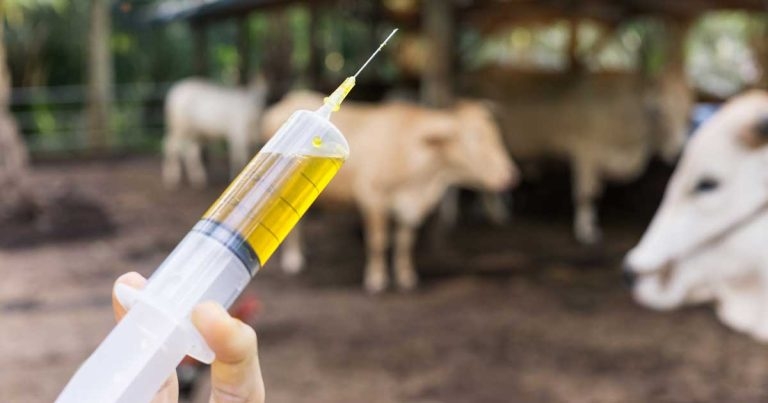6 Jun 2022
Rationale and background for vaccination in dairy and beef cattle and sheep feature in guidance, which stipulates which ones should be used as a default unless justified otherwise.

Image: Kittiwat / Adobe Stock
New guidance on livestock vaccination prioritises the diseases animals should be protected from by default to improve cattle and sheep health in the UK.
NOAH has launched its Livestock Vaccination Guideline, which is designed to provide support to farm vets, SQPs, and farmers on best practice for preventing and controlling disease on farm.
A 53-page report outlines the rationale and background for vaccination in dairy and beef cattle and sheep, and features a “categorisation tool” that grades livestock vaccinations under two categories.
Category one covers vaccinations considered highly important in flocks and herds, and diseases against which animals are “vaccinated as default unless appropriate justifications have been clearly identified by the vet and farmer working together”.
The guidance stipulates any justifications for not vaccinating need regular review.
Bovine viral diarrhoea (BVD), infectious bovine rhinotracheitis (IBR), leptospirosis, bovine respiratory disease and calf scour are all ranked category one for dairy cows, with BVD, leptospirosis, clostridial diseases, respiratory syncytial virus and IBR the most important in beef cows and calves.
Clostridial diseases, footrot, toxoplasmosis, pasteurellosis and enzootic abortion of ewes are all category one vaccinations that should be the default in sheep.
Other vaccinations are classed under category two, where they are recommended as best practice with flexibility, depending on farmers and vets reviewing and discussing specific herds and flocks.
NOAH said the guideline brings current veterinary clinical experience and research together to demonstrate a best practice approach to vaccination decision-making.
Jonathan Statham, who chairs the Animal Health and Welfare Board for England, is report co-author for dairy; Fiona Lovatt, an RCVS-recognised specialist in sheep health covers the sheep section; and Jon Henry, RCVS advanced practitioner, discusses beef cattle considerations.
NOAH said the guideline supported the UK’s animal health and welfare ambitions, its stance on food security and safety and advanced competitiveness of produce from UK livestock.
Dawn Howard, chief executive of NOAH, said: “Prevention of disease is at the heart of NOAH’s vision for animal health and welfare in UK farming, and our Livestock Vaccination Guideline aims to ensure that those who make decisions about animal health and vaccination across the industry and on the farm have access to best practice guidance.
“We are focusing on priority diseases and those conditions where increased uptake of vaccination can make a real difference to the level of disease across animal populations.
“This will not only help improve health and welfare on individual farms, but also help raise health and welfare levels across the whole country, meaning UK farming will be better equipped to provide safe, high-quality and nutritious food, while also delivering the environmental benefits from healthier animals. Livestock vaccination can be complex, but provides huge benefits – not just for animal health and welfare, but it also has a positive impact on food, economic and job security in the UK.”
She added: “Having the right tools, medicines and technology to provide adequate prevention, diagnostics, monitoring and treatment has never been more important.”
She added: “We would like to thank Jonathan Statham, Fiona Lovatt and Joe Henry for their extensive work in bringing together the insight and expertise needed for this comprehensive document.
“As well as helping ensure the vaccines we have available today are used most effectively, NOAH members are working on pioneering new vaccines for existing diseases, including those which can help against disease that may develop in the future, benefiting not only animals, but also humans.”
Mr Statham said: “Vaccination can have a major positive impact on animal health and welfare, one health and sustainable farming, but how well is the true potential of vaccination really being harnessed, and how can we improve our current approach?
“To answer this question requires a fresh and challenging review of current practice, which is what this guideline aims to achieve.”
Information in the guideline stresses that the most effective way to support responsible use of antibiotic use is to prevent disease.
The UK is making great strides to reduce its use of antibiotics, with a 52% reduction from 2014 to 2020, while a Medicine Hub has been launched to collect this data in ruminants (31 May issue).
The guideline has been described as a “seminal publication” by one company, which welcomed the independent expert recommendations advocating for robust vaccination strategies to be routine in livestock management.
Sam Gayton, MSD Animal Health UK ruminant business unit director, said: “This new guideline from NOAH is a seminal publication that places a new and very specific focus on the role of preventive health in UK farming.
“It will play a pivotal role in helping the whole industry adopt best practice, and ensure we can continue to position the UK as the home of excellence in animal health and welfare.
“Ultimately, sustainable food production starts with healthy animals, and the guideline brings a new urgency to discussions between vets, farmers and industry, leading to effective vaccination strategies becoming the default on-farm.”
The NOAH guideline is available online now.